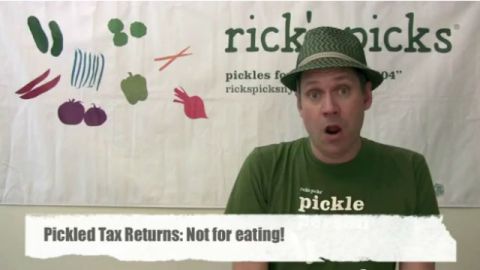The Man Who Pickled Justin Bieber’s Hair

“In these changing and uncertain times, pickles are one thing we can preserve.”
What’s the Big Idea?
What do TV and pickle production have in common? There’s really only one person you can ask, and according to him, there’s a lot of overlap. At the height of his television career, Rick Field was writing, directing, and producing for VH1 and PBS’ Bill Moyers. Today, he is a highly successful pickle entrepreneur.
Do not even think of those flabby, luminous yellow spears that delis sometimes wrap up with your sandwich, making the rye bread all soggy. As CEO ofRick’s Picks, Field creates and markets tastebud-bending products like“Smokra” – pickled okra with smoked Spanish paprika and chili peppers, and“Phat Beets” – aromatic beet slices with ginger, rosemary, and lemon. The company has grown from a single stand in a New York City greenmarket to a nationwide supplier to specialty markets like Whole Foods and Dean & Deluca (which still operates greenmarket stands).
Rick Field: A good producer basically takes an idea, gathers a bunch of people around it and generates enthusiasm for it to create an excellent product. That sort of energy and organizing is also applicable to pickle making, except now the challenge is “let’s figure out how we can make 2,000 jars of pickled beets with 6 people in 8 hours for an affordable price.”
Making champagne on a beer budget: When I was in television I was always in environments where money was a challenge. It was always a question of “how do you make champagne on a beer budget?” For lack of a better term, I would say it’s a scrappy aesthetic that I had in television, which carried over to the work in pickles, trying to figure out how to maximize whatever we have and do it in a way that was very frugal.
About seven years before he left the TV business, Rick started pickling as a hobby – recreating family recipes from his childhood:
Rick: I realized that the basic equipment required to make pickles at home is very minimal. The barrier to entry is very low. You don’t need a $400 blender or a $9 million stove. A couple of pots and a couple of very inexpensive accessories and you’re good to go.
And so the first thing I did was to replicate these sort of locked-in-time-and-space, mid-twentieth-century family recipes that were fairly staid and highly traditional, but really fun and for me connected very actively and dynamically to a potent set of family memories and personal history.
A Sign from the Pickle Deities
Seven years later, Rick’s Picks have arrived, carving out a mini cultural niche of their own in the American culinary landscape. While they aren’t yet commercial on the scale of a Vlasic or a Heinz (and may never be, since most are made by hand with expensive ingredients), they’re convincing chefs and food lovers nationwide that pickled beets, beans, and okra have evolved beyond those dubious paperweights gathering dust on your Eastern European Grandma’s basement shelf.
Hey, Don’t Mess With My Grandma’s Pickles.
Rick: A lot of people, whether they are from Poland, from Louisiana, from Japan – in most corners of the world there is a very vibrant tradition of pickle making in some form or other and people really resonate back to that. I call it “the heritage piece” and whether it’s a cultural thing that they experienced in their homeland or a family thing, it’s powerful.
One of the interesting things about starting to sell pickles professionally was the fact that you have a lot of customers who try your stuff and say “Well these are very good, but they’re not as good as my grandmother’s, sorry.” And it’s hard to argue with Grandma.




